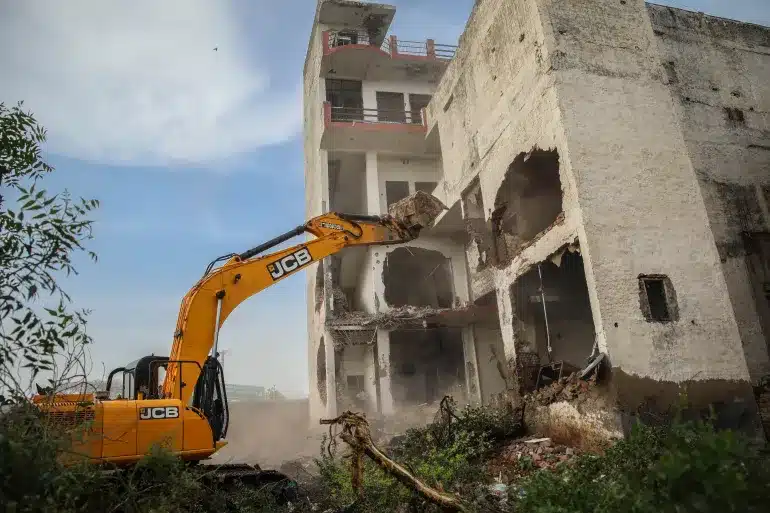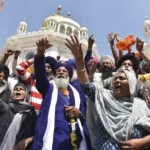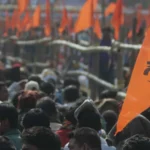In this day and age, bulldozers have practically evolved into a national symbol in India, albeit for the wrong reasons. Far from evoking pride or inspiration, they have come to represent an extrajudicial tactic, or a political expression, used against rioters, alleged criminals, and perpetrators of communal violence. Increasingly, they have been employed as a weapon by the country’s ruling, Hindu nationalist Bharatiya Janata Party (BJP) government to destroy many people’s houses and means of subsistence, primarily the minority Muslim community. Against this backdrop, the recent incident of a mother and her young daughter perishing in a fire during an anti-encroachment drive in an Indian village sparked a renewed flurry of debate.
India: Razing Justice to the Ground
The family of the victims, who reside in Uttar Pradesh’s Kanpur Dehat district, said that police set their hut on fire while the women were inside. Later, local police said that the two had immolated themselves; however, 39 people have since been charged with murder by the state police. Among those accused are the station house officer, the subdivisional magistrate, and the bulldozer operator. They are also charged with attempted murder and voluntarily causing harm. According to a police official, encroachments on government property were being demolished by the police, district administration, and revenue officials. The locals claim that no advance notice was given to them and that the officials simply showed up in the morning with a bulldozer.
Notwithstanding the horrific circumstances, the tragedy is only the most recent in a string of demolitions that opposition parties and human rights advocates are branding “bulldozer justice” in India.
While BJP leaders have frequently asserted that nothing they do violates the law, their detractors contend that the real motivation behind these demolitions is not to raze the buildings for allegedly being illegal but rather to silence their owners for voicing opposition to and being perceived as a hindrance to the government.
Inarguably, the term “bulldozer” entered Uttar Pradesh’s (UP) election and political jargon as a result of Yogi Adityanath’s extensive political use, which then spread throughout India. Although bulldozers are commonly used in India to dismantle unlawful constructions, in this instance, they have been used as an emblem of arbitrary power. On the contrary, state officials have insisted on their usage of bulldozers exclusively for the elimination of “criminals and the mafia” who steal land from the poor. Moreover, the UP government has claimed in the past that demolitions have had no relevance to riots in the country and that due process has been followed, along with a prior notification.
Yogi Adityanath: The Trailblazer
As it happens, “bulldozer justice” dates back to Yogi Adityanath’s first tenure as UP’s chief minister, which began in March 2017. His initial statements promised that, among other things, his administration would reform the state’s law and order situation. Furthermore, the establishment of an anti-mafia task force involved political slogans such as “Leave UP or Go to Jail.” In September of the same year, Adityanath first threatened to bulldoze the homes of criminals. He added that it will take some more time to apprehend additional criminal elements and vowed to bulldoze the homes of anyone even considering committing crimes against women and disadvantaged populations of society.
Significantly, the house and four vehicles belonging to India’s notorious crime lord Vikas Dubey were demolished by the Kanpur district administration in July 2020. A few days prior to the demolition, eight police officers had been killed during an attempted arrest in which Dubey was the prime suspect. Merely a week later, Dubey was shot dead by police while allegedly trying to flee from custody after the vehicle that was meant to move him was involved in an accident.
Then, in August of the same year, properties related to Mukhtar Ansari, a former criminal turned politician who was five times elected to the Legislative Assembly from the Mau constituency, were demolished. According to a government official, the property was built on land owned by migrants in Pakistan. Subsequently, in the Lucknow area of Dalibagh, the Lucknow Development Authority (LDA) also razed two “illegal buildings” that were registered in the name of Ansari’s family. According to LDA officials, no approved map was applied to the construction of the buildings.
The properties, they said, were built on “evacuee property” making them subject to the Enemy Property Act, which permits and governs the seizure of property owned by Pakistani nationals in India.
Remarkably, more than 250 police officers and 20 bulldozers participated in the demolition of the two structures, which were built on a plot of land that measured about 22,000 square feet and was worth several crores.
In India, footage depicting the destruction of their properties was repeatedly broadcast on national television, earning the government acclaim from the public for “taking a firm stand against criminals”. Nonetheless, it is now more frequently employed as a strategy to intimidate members of the opposition and the government’s critics, specifically Muslims.
Judge, Jury, and Executioner
Amidst widespread media attention, authorities in the city of Prayagraj (formerly Allahabad) demolished Javed Mohammad’s house in June last year on the grounds that it was illegally constructed, a claim that his family refuted. The building’s purported illegality, according to commentators, was not the underlying cause for the demolition; rather, he was punished for his ardent criticism of the government. The day before the demolitions, police had arrested him because they claimed he was the “mastermind” behind the violent Muslim protests that had taken place in the city in response to former BJP spokesperson Nupur Sharma’s provocative remarks about the Prophet Muhammad.
The growing instances of demolitions have drawn attention internationally and in India, where some claim that only the barest semblance of legality shields this authorized action and that it violates the fundamental spirit of the law. In the aftermath of the protests over Nupur Sharma’s contentious comments and the demolition of accused Javed Mohammad’s residence, former justices and distinguished attorneys wrote to the country’s chief justice, urging the court to take action against the “violence and repression against Muslim citizens” in India and describing the deployment of bulldozers as an intolerable subversion of the rule of law. The letter said that the coordinated actions of the police and development authorities had clearly demonstrated that demolitions are a kind of collective extrajudicial punishment.
Such intimidation tactics may have sparked outrage throughout the world, but they have given Adityanath tremendous political leverage and even the blessing of Indian Prime Minister Narendra Modi.
In December 2021, Modi theorized that the individual responsible for nurturing the mafia or the “illegal” construction also experiences pain when the bulldozer rolls over it during a visit to UP. In response to the prime minister’s remarks, bulldozers were employed in the wake of religious violence early last year in the state of Madhya Pradesh and in the country’s capital, Delhi—disproportionately targeting Muslims by destroying their houses, shops, and small businesses.
With this blatant exhibition of state impunity, it is worth remembering that no court decision mandates that someone’s property be demolished, whether or not they were convicted of a crime and even after being proven guilty. Hence, when the BJP government of India dispatches a bulldozer, it is effectively implying that anyone who protests against them will be crushed under its force.
The views expressed in this article are the author’s own. They do not necessarily reflect the editorial policy of the South Asia Times.
Aisha Saeed, is an independent analyst with a keen focus on foreign policy and international relations. She can be reached at @MsAishaK on X (formerly Twitter).





Add a Comment